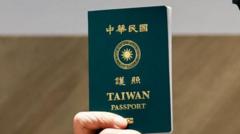Taiwan has issued a strong condemnation towards Somalia after the East African nation declared that holders of Taiwanese passports would no longer be permitted to enter or transit through its territory. This ban, enacted by Somali aviation authorities, took effect on April 30 and was reportedly influenced by China's stance on its territorial claims. Taiwan's Foreign Ministry has expressed outrage and demanded the immediate retraction of the ban, labeling it a violation of the travel rights and safety of Taiwanese citizens.
Chinese officials have applauded Somalia’s decision, framing it as a necessary adherence to the "one-China principle." Taiwan, a self-governed island, operates independently with its own democratic elections. However, it faces significant diplomatic isolation, previously recognized by only a few nations globally. Recently, Taiwan has been strengthening its ties with Somaliland, a self-declared independent region that broke away from Somalia over three decades ago. The mutual establishment of embassies in 2020 has garnered criticism from both China and Somalia.
The Taiwanese Foreign Ministry has advised its citizens against traveling to Somalia or Somaliland until the ban is lifted, underscoring concerns for their safety. The ongoing geopolitical complexities between Taiwan, China, and Somalia highlight the fragile state of international relations and the challenges facing unrecognized territories. As tensions rise, the situation warrants close observation from the international community, especially given the historical and cultural significance of these regions.


















